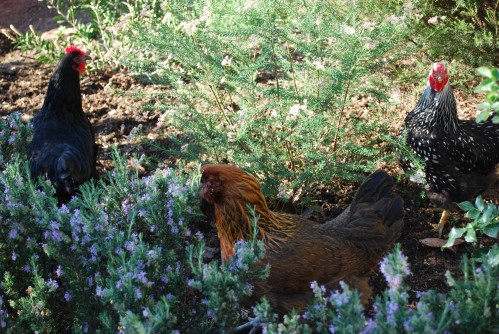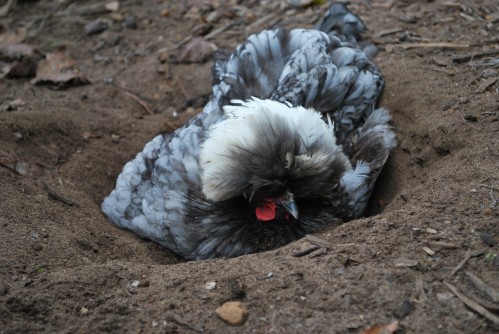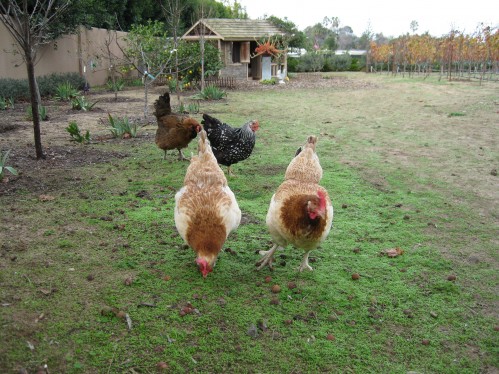 In the photo above are my beloved hens, Louise, Julia, and J.Lo, named after the posh Hollywood crowd. Believe me, besides being pretty, they have attitude, too.
In the photo above are my beloved hens, Louise, Julia, and J.Lo, named after the posh Hollywood crowd. Believe me, besides being pretty, they have attitude, too.
If you have the space, and are properly zoned to have chickens in your backyard or property, I would highly recommend jumping into the world of chickens. Chickens are so much fun, and relatively easy to take care of, and require just a few basics.
Chickens need protection. They need a protection in the form of a building, pen, or coop, from extreme temperatures, winds, and drafts. They also need protection from elements that might harm them such as neighbor's dogs, hawks, coyotes, etc. Place straw or pine shavings on the floor, and keep clean. Ideally, it is nice to have a place of protection at night time and for extreme weather conditions, as well as an outdoor protected pen where they can be active.
Chickens need a source of water and feed at all times. Chickens need to eat constantly, and require "laying mash" in their egg-laying years. In fact, when I open up my chickens in the morning, and stir up their feed bucket, every morning is like Thanksgiving to them...they can't wait to get to the feed bucket after a night's sleep. Every day I give my chickens a fresh treat consisting of greens, fresh fruit, or some type of vegetable. A fresh, clean water source is important for chickens to have at all times. I have two for mine, one that is inside their house, and one for their outside pen.
Chickens like a nesting box for laying eggs. Chickens start laying their first egg at about six months old. Their egg production can be described like a "bell-shaped curve". Initially, once they start laying, they will lay an egg every 24 hours, or an egg a day. They will lay at that rate for their first 1-2 years, and they will gradually taper off, to the point where they do not lay any eggs. You can build a row of nesting boxes inside their chicken coop. It is an open square shape box, where straw or pine shavings is placed for bedding, and where the hen can go and quietly lay her egg. It is really quite an incredible process. Chickens naturally molt about once a year. Call it a vacation, or time of rest in sync usually with the decreasing day length. Do not be alarmed, they will lose their feathers, stop laying for a few weeks time, and then begin to grow back beautiful new feathers, and commence with the business of laying eggs once again. Fresh eggs are so beautiful and taste incredible. They are literally golden eggs.
Chickens like a roosting bar, 24-30 inches off of the ground to sleep at night. This bar assimilates a tree branch. They feel protected, and want to be off of the ground to sleep. I have a manure box with quarter inch wiring directly under the roosting bar, which catches most of their manure from the night before. Some people clean it once a week or less, but I collect their manure every morning, and put it in my compost pile. I like to avoid any problems like excess flies and odor that a build up of manure might cause.
A hen does not need a rooster to lay eggs. A hen does need a rooster if you are planning on having fertilized eggs, and eventually chicks for your flock. Baby chicks especially need to be kept warm and protected. Roosters introduce a whole different element to your flock, noise, and often they exhibit aggressive behavior protecting their hens. You might do yourself, and your neighbors a favor, and start with a flock of hens only.
Chickens are fun, social, and with individual personalities. Don't get just one chicken. They are social, so start off with at least 2-3 chickens. You can bet there will be a pecking order established within your flock, which is not necessarily a bad thing. Chickens love to explore, and are curious about everything. They love gardens, and will be a faithful garden companion. They respond to kindness, a routine, and familiarity of people feeding and caring for them. If you plan on going on vacation, etc., make sure you have someone reliable to watch and care for your chickens, just like you would do for your other pets.
If you have been thinking of getting chickens, spring into summer is your best time. Your local feed stores might carry a nice variety of "pullets", young laying hens, for you to choose from. There are certainly a wide variety of breeds available for the chicken enthusiast. I like brown eggs, and have found the heavy breed chickens, such as the Buff Orpingtons, and the Australian Black Australorps to be great egg producers, and "people" chickens. A fabulous website and place for information on different breeds and mail order of "specialized fowl" is www.mcmurrayhatchery.com.
I can not say enough about the "joy of chickens", you must experience them for yourself.




 In the photo above are my beloved hens, Louise, Julia, and J.Lo, named after the posh Hollywood crowd. Believe me, besides being pretty, they have attitude, too.
In the photo above are my beloved hens, Louise, Julia, and J.Lo, named after the posh Hollywood crowd. Believe me, besides being pretty, they have attitude, too.